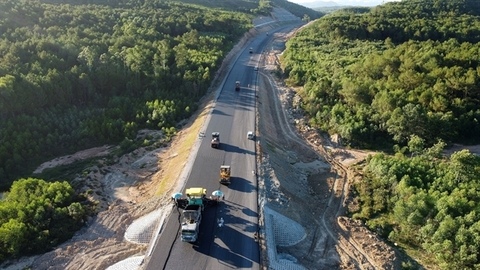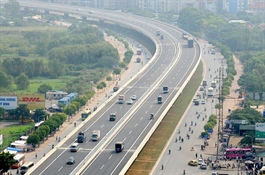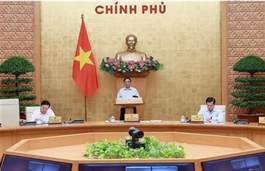Changes required to improve efficiency and management of public invesment: WB
Changes required to improve efficiency and management of public invesment: WB
Major changes are required to improve Việt Nam's public investment, both in efficiency and post-management, said a report by World Bank (WB) released yesterday.

The WB suggests that Việt Nam should invest an average of 7.3 per cent of annual GDP into infrastructure during the 2021-30 period. — VNA/VNS Photo |
In order to reach upper-middle income status by 2030 and high-income status by 2045 as an industrialised nation and higher quality of life for citizens, Việt Nam must invest an average of 7.3 per cent of annual GDP into infrastructure during the 2021-30 period.
Despite growing needs, Việt Nam's public investments have been on a declining trend from 8 per cent of GDP in 2011 to 6 per cent in 2022. While every effort should be made to reverse this trend,11 improving the efficiency of investment is also key, as it would have a significant impact on aggregate productivity growth and GDP levels, said the report.
According to WB, between 2011 and 2019, it took more than six VNĐ in investment to generate one VNĐ in additional output. As a result, the country achieves much less growth per dollar of investment than China, Malaysia, the Republic of Korea, Singapore, and Thailand at comparable levels of per capita income and development
Meanwhile, Việt Nam's infrastructure quality ranked 77th out of 141 countries worldwide,13 behind regional peers such as China, India, Indonesia, Malaysia, and Thailand, Việt Nam's direct competitors for foreign direct investment.
Investment budgets suffered from chronic under-execution with only 77 per cent of allocations spent between 2017 and 2022. The large differences between budgeted and actual spending (23 per cent), and the consequential high capital expenditure carried over from one year to the next, are significantly larger than in many peer countries, and beyond international good practices which suggest the variation levels to be below 5 per cent.
In addition, a recent World Bank review of selected, large-scale transport projects found an average delay time of five years, and an average cost overrun double the original cost at the design and budget allocation stage.
Public asset management remains inadequate. Post-construction infrastructure assets are not properly recorded nor managed after project completion, causing inadequate maintenance of public assets. Overall, it is estimated that the budget only financed 40 per cent of the minimum needs in road infrastructure maintenance, according to the report.
Due to the government's policy of spending decentralisation since the 90s, the share of central government investment in total public investment declined from 40 per cent in 2017 to 20 per cent in 2022.
While the policy has produced some positive outcomes, particularly in service delivery it has led to weak coordination across provinces and with central government and to proliferation of duplicate investments which are executed by both the central government and 63 provinces. There has been over-investment by provinces in low-value, disjoint projects and stranded assets, with a potential negative impact on the environment.
To make matters worse, the country's public investments and assets are increasingly exposed to growing climate change-related risks including physical threats related to extreme weather events and climate change, and transition risks as the country commits to net zero emissions by 2050.
Going forward
Economists from WB advised the government to improve the “quality-at-entry” of projects by providing more time and budget, and methodological guidelines to prepare project pre-feasibility studies. For example, it is crucial to regularly update unit costs and land prices close to market prices to ensure cost estimates are realistic.
Meanwhile, it is highly recommended that the government take action to accelerate project implementation. Public asset management also needs to be strengthened to maximise the impact of the project after completion. WB also called for stronger public asset management with the establishment of a database of all infrastructure assets with their values.
In addition, greater rationalising of intergovernmental fiscal institutions was required with a focus on rebalancing the infrastructure investment budget from the provincial level to the central government level for a more strategic approach to public investment.
WB recommended a new co-financing mechanism to be institutionalised based on a well-defined formula that integrates external and domestic financing considerations into a holistic framework. Fiscal mechanisms and incentives should be provided to enable green and climate actions across levels of government, such as ecological fiscal transfers and payments for ecological services.



























